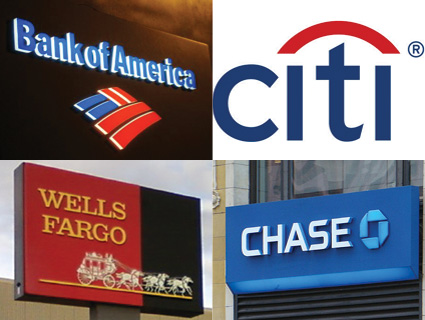More than any other issue, the question of what to do with too-big-to-fail banks has perplexed and divided lawmakers since the glaring need for new financial rules was laid bare in the fall of 2008. Ever since global insurer AIG teetered on the brink of collapse in 2008, and then took a $134 billion lifeline from the Treasury Department and Federal Reserve, experts, financiers, and politicians from both parties agreed something had to be done to prevent the next AIG from imperiling the global economy. Almost two years after the financial collapse, though, lawmakers still can’t agree on how to fix our too-big-to-fail conundrum.
A recent exchange on the Senate floor illustrated this chasm. In one camp are senators like Ted Kaufman (D-Del.). Kaufman took to the floor on Monday for an impassioned speech calling for strict caps and restrictions on the size of banks. Citing financial experts and even former Treasury Secretary Robert Rubin, Kaufman said too-big-to-fail banks were too-big-to-regulate and a danger to the economy. Kaufman’s amendment, authored with Sen. Sherrod Brown (D-Ohio), would not only cap the size of banks’ balance sheets but also the amount of leverage—the money they borrow to amplify the gains or losses of their investments—they can use. “The truth is that these financial institutions have become so large and complex that regulators rely upon the banks and the markets to self-regulate,” he said, adding that self-regulation is effectively no regulation. Capital and leverage limits essentially dummy-proof financial regulation, taking decisions out of regulators’ hands and simply saying banks can’t grow to AIG-like size.
Kaufman’s proposal was cheered by outside experts like Simon Johnson, former chief economist of the International Monetary Fund, who wrote on Tuesday that ending the specter of megabanks is the “most pressing issue of financial reform.” Yet Johnson rued the fact that Kaufman’s proposal isn’t getting a fair hearing in the Senate, which is content to “keep the ‘debate,’ in terms of votes, on issues less likely to infuriate powerful banks.”
Presumably, Johnson is alluding to senators like Bob Corker (R-Tenn.), who today brushed off the need for capital and leverage restrictions. Corker, in essence, said we didn’t these caps; the best way to deal with too-big-to-fail banks, he said, is to remove the implicit guarantee that megabanks will always be bailed out. The prospect of failure, Corker’s thinking goes, will dissuade banks from growing to too-big-to-fail size, and if the bill ends up as he wants it, there will be no bailouts. “The best way to level the playing field is ensure that if a big company fails it fails,” Corker said. The Tennessee senator said he also supported a resolution authority, which would be a special process created by the bill to handle the failure of these big banks in a timely way, outside the traditional bankruptcy process.
Think of Kaufman’s proposal as the proactive one, and Corker’s the reactive. While some see Kaufman’s idea as the unwarranted reach of big government, Corker’s stance overlooks the turmoil and pain involved with the failure of a big bank, an event sure to shake the foundations of the financial markets like AIG’s near-collapse did. Letting big banks fail, instead of offering ad hoc bailouts, is indeed important, but Corker’s position doesn’t prevent the growth of new megabanks at all, failiure or not—a situation with ominous consequences for the markets and our country, says Johnson. At the end of the day, he sees the war over too-big-to-fail as more than just a debate over bank size:
This is, of course, partly about the political power of corporations. But corporations are, in this sense, merely a veil—this is really all about which people have what kind of power in our society. To what extent are we really still a democracy—and how far have we already slipped down the road to oligarchy?

















